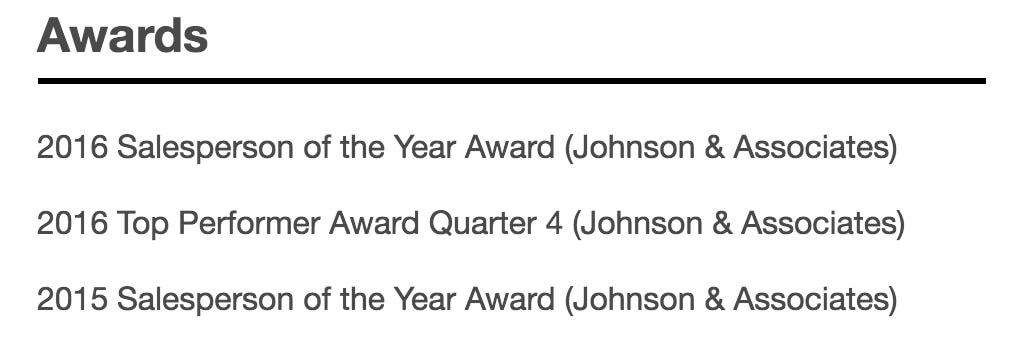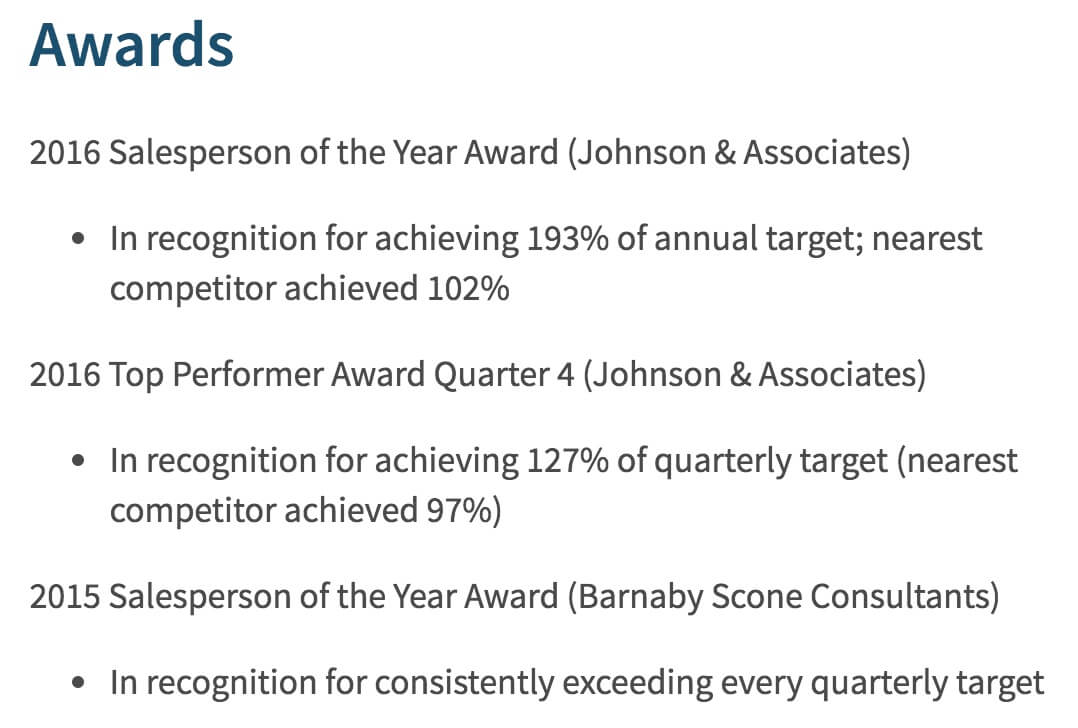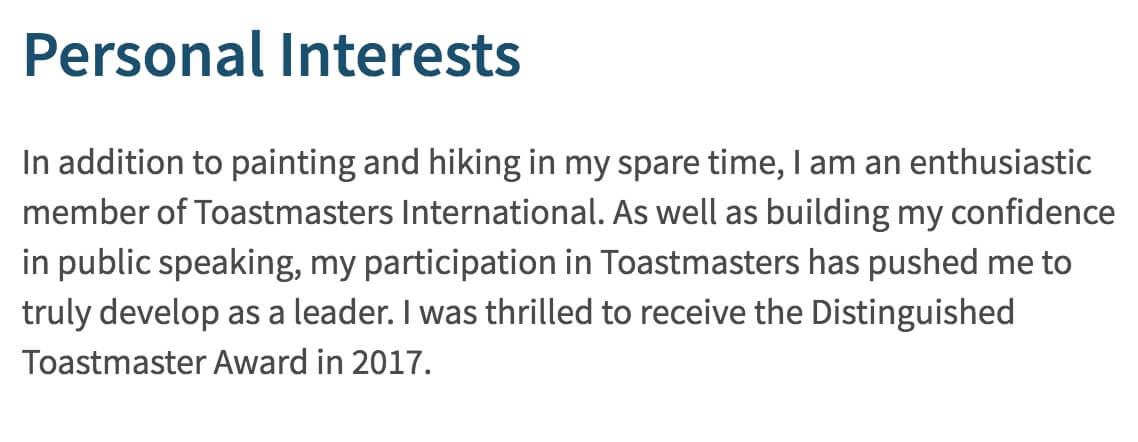How to List Academic Achievements on a Resume
This in-depth article covers how to list awards on a resume. If you are looking for academic achievements, check out this detailed guide on listing academic achievements on a resume or our Career Center for more job seeker resources.
In an increasingly-competitive marketplace, sometimes it really can come down to the little things that we often overlook in resumes, such as awards and achievements, that may make a big difference.
The awards and achievements listed in a resume might be the final factor that can get you a callback for a job interview — instead of being forgotten in their email inbox.
But just having an award or two on your resume isn’t enough for hiring managers. You need to know what awards are actually important to employers, and how to list them in a resume, to actually get noticed.
While some job seekers may want to include every award that they have ever received in a lifetime of school, work, and extracurriculars, other applicants are a little hesitant to tell their life stories in their resumes.
The best advice lies between these two views: include awards that are relevant to you and the job post.
Awards that provide clear evidence of experience or a skill relevant to your target job will help you to stand out. But you have to be critical, selective, and detail-relevant when it comes down to deciding which awards to include.
This is especially true in our fast-paced world. The latest resume trend is job seekers writing a specific resume based a particular area of expertise, instead of a general professional summary rolled into a one-page resume.
This resume-writing article covers:
- Exactly how to list awards on a resume
- How to describe them in a relevant way to employers
- List of common awards and recognitions to list in a resume
You should also know that while this article is primarily aimed at resumes for students, recent grads, and other professionals at all stages of their career, it also covers specialist professionals in academia, the medical industry, and STEM.
What Are Relevant Awards For Resumes?
An award is a general term for a broad range of official recognitions on a professional, academic, or personal level. There are many types of awards that a job seeker could have, but not all awards will be relevant for you and the job you’re applying for.
When deciding what awards to include in your resume, bear in mind that not every award needs to be listed. In general, only include awards and other recognition if these provide evidence of experience or hard skills that potential employers may be looking for. For example, if you received a ‘Team Player Award’ in recognition of your collaboration skills, you may consider omitting this unless at an early stage of your career (when you are more likely to seek ways to add grit to your resume).
The same advice goes for common awards that are no longer current, such as the Employee of the Month recognition you received more than five years ago. While the Boy Scouts of America Silver Buffalo Award from twenty years ago may seem attractive to include because of its recognition of national-level noteworthy or extraordinary service, it will be of little interest to a potential employer if you are a mid-career level professional.
When thinking about what awards to include in your resume, don’t forget that some awards don’t actually have the word ‘award’ in their title. These may range from the above-mentioned Employee of the Month (which often drops the word ‘award’) through to Dean’s List. What you ultimately decide to include in your resume, however, will depend very much on your job, industry, career level, and available page space.
In general, the further you progress in your career, the more career-related your listed awards should be. If you’re just starting out, potential employers are much more likely to be interested in that Dean’s List or Honor Roll recognition than they will later on. As you gain experience, academic awards can graduate to an honourable mention against the appropriate qualification under ‘Education’, or be removed altogether.
Some awards are highly valued in specific industries, but have little value in others. A Top Chef award from your days working in that local fine dining restaurant would be of interest if you stay within the food industry, but would be of no interest to a potential employer if you move into an unrelated sector or industry (unless you actually won the top prize on the TV show Top Chef, of course, in which case, go right ahead and tell the world!).
Don’t forget about hobby and personal interest awards, either! If you have been recognized for volunteer or extracurricular activities that are immediately relevant to professional skills, such as leadership, project management, interpersonal skills, then by all means include these in your resume. Such awards can be included in a separate Awards section, or towards the bottom of your resume under the Personal Interests section (an optional resume section).
Confused about what awards you should include in your resume, and which awards you shouldn’t list? Here is a quick list of do’s and don’ts for how to know whether you should list an award in your professional resume:
Award Do’s:
- Do include awards that highlight your skills and abilities related to the job you’re applying for
- Do remember to include all recognitions that you’ve received, even if they were not formal awards
Award Don’ts:
- Don’t include any award that is older than 10 years unless it is crucial for your resume
- Don’t include awards that are not important or relevant to your career
- Don’t list awards that do not add value to your job application
Popular Awards To List In Resumes – Examples
Here are example of common awards that job seekers list on resumes, divided by type:
Business and Specialist Industry Award Examples:
- Employee of the Month/Employee of the Year
- Top Salesperson Award
- Best Performer Award (financial or non-financial performance-based)
- Customer Service Award
- Chairman’s Award
- Leadership Award
- Medical Information Leader of the Year Award
- Scientist of the Year Award
- Young Professional Engineers Award
Academic Award Samples:
- Scholarships
- Honor Roll
- National Merit Scholar
- Dean’s List
- Valedictorian
Academic & Professional Award Examples:
- Faculty Merit Award for Scholarly Activities
- Chancellor’s Teaching Excellence Award
- Distinguished Scholar Award
Relevant Extracurricular Award Examples:
- Distinguished Toastmaster Award
- Young Entrepreneur of the Year (such as from a Chamber of Commerce)
Exactly How to List Awards On A Resume
Now that you know which awards are relevant for you and your job application, you should learn how to include awards on a resume correctly.
Here is a quick checklist on how to include awards on a resume:
- Did I list awards in chronological order?
- Did I include a description when it was appropriate to list one (see next section for more help)?
- Is the award title correct? If you’re not sure, check the original award or do a quick Google search.
- Did I avoid using unusual or confusing acronyms or abbreviations?
- Did I avoid repeating the same information in an awards section and somewhere else on my resume?
If you’re just starting out in your career, or if you work in academia or a specialist field (such as engineering or medicine), it often useful to have a separate Awards section to add visual weight to your resume. Otherwise, awards can be listed in the actual job descriptions or in the Education section, depending on which section is more relevant to the award.
In a standard business resume where employers tend to quickly skim documents for relevance, award formats should be kept fairly concise yet usefully informative.
In academic or specialist resumes, or if you are just starting out in your career and need to add depth to your resume, more detail is broadly acceptable. We’ll look at each of these in more focus below.
There are 4 different ways to include and format awards in a resume. I will go into detail about each of these formatting methods for resumes:
- Including awards in job descriptions
- Listing awards under an “Awards” resume section (concise)
- Listing awards under an “Awards resume section (detailed)
- Including achievements under “Personal Interests” or “Hobbies” resume section
Listing Awards In Job Descriptions
How to list awards in the job description of a resume (text example):
Employment History
T-shirts for Tots, Boston, Massachusetts
Sales Associate November 2015 – Present
- Received Salesperson of the Year Award in 2016 in recognition for achieving 193% of annual target (nearest rival achieved 102%)

Listing Achievements Under “Awards” Resume Section – Concise
This is how to list awards under an “Awards” resume section with very little text:
Awards
2016 Salesperson of the Year Award (Johnson & Associates)
2016 Top Performer Award Quarter 4 (Johnson & Associates)
2015 Salesperson of the Year Award (Johnson & Associates)

Listing Achievements Under “Awards” Resume Section – Detailed
This is how to include awards in a resume with more information for the hiring manager:
Awards
2016 Salesperson of the Year Award (Johnson & Associates)
- In recognition for achieving 193% of annual target; nearest competitor achieved 102%
2016 Top Performer Award Quarter 4 (Johnson & Associates)
- In recognition for achieving 127% of quarterly target (nearest competitor achieved 97%)
2015 Salesperson of the Year Award (Barnaby Scone Consultants)
- In recognition for consistently exceeding every quarterly target
How To List Awards In “Personal Interests” or “Hobbies” Resume Section
This is how to include an achievement under your “Personal Interests” or “Hobbies” section of a resume:
Personal Interests
In addition to painting and hiking in my spare time, I am an enthusiastic member of Toastmasters International. As well as building my confidence in public speaking, my participation in Toastmasters has pushed me to truly develop as a leader. I was thrilled to receive the Distinguished Toastmaster Award in 2017.
How to Describe Awards on a Resume
If you decide to add a description to an award, a good rule of thumb is describe awards briefly and objectively.
When writing a description, only include information that is important to the job application. Avoid using a lot of unnecessary words to fill space in a resume. Having a full looking resume doesn’t mean that the hiring manager will be impressed unless the information is relevant and interesting. Stick to easy to understand and straightforward language.
Remember, awards can convey to a hiring manager insight into your strengths, both at work and in the wider community. Ask yourself what attributes you want your selected awards to highlight. For example, do you want to draw attention to your leadership skills or specific industry know-how? Ensure that your description emphasizes these attributes. When in doubt, ask a friend or mentor to review your description with fresh eyes to ensure it sends the message you want to give to an employer.
Example of a Good Award Description
2016 Salesperson of the Year Award (Johnson & Associates)
In recognition for achieving 193% of annual target; nearest competitor achieved 102%
Example of a Flawed Award Description
2016 Salesperson of the Year Award (Johnson & Associates)
Despite a slow start, I still managed to reach my annual target by increasing my amount of cold calls and by contacting existing clients to upsell/cross-sell.
As you can see, the good description gets to the point concisely, uses objective language, and backs the award up with quantifiable evidence. On the other hand, the ineffective description rambles on without a clear purpose, uses subjective language, and forgets to include factual evidence to support the award.
Here is an easy checklist for making sure you’re describing an award on a resume properly:
- Did I use objective and fact-based language?
- Did I use evidence to support the award, such as measurable achievements or metrics?
- Did I keep the award description concise and relevant to the job post?
- Did I avoid rambling and avoid details that aren’t relevant or interesting?
- Did I avoid including irrelevant information?
- Did I avoid misspelling the name of the award or any words I used to describe it?
Get Started On Your Resume!
Including relevant awards or special recognition is a great way to catch the eye of potential employers and give the reader insight into your skills and capabilities. Selected carefully, awards can help to set you apart from the crowd and give the reader insight into your capabilities such as initiative, leadership, sales, and so forth. Depending on the resume, type of award, and how far along you are in your career, this information can be listed in your job descriptions, in a separate section, or under Education.
Our advice would be to only include awards and other recognition if these provide evidence of skills or abilities that potential employers are likely to be looking for. If you’re not sure, ask someone for a second-opinion.
If you need a little extra help to get started on your resume, use the customizable online resume templates from Resume.com — no credit card or payment info required.
Final Awards Checklist
- Have you included the award date/year, award name, issuing organization, level (e.g. national or international, if relevant), and reason you received it (in the job description or in a separate section)?
- Have you used consistent formatting for all awards?
- Is the information easy to read?
- Is the award outdated/irrelevant?
- Have you been selective?
- Have you proofread it for grammar, spelling, and punctuation consistency?
- Have you avoided unfamiliar acronyms and abbreviations?
- Finally, does the award truly make you stand out?

